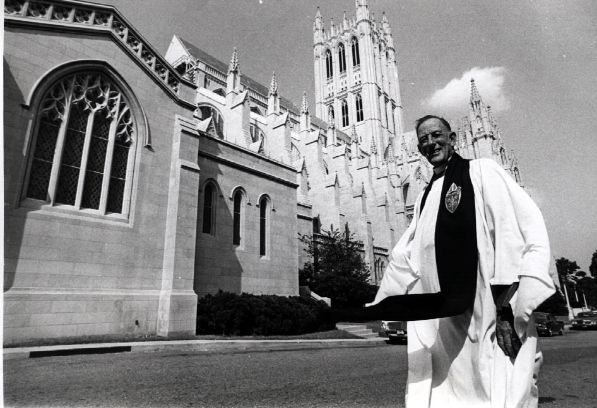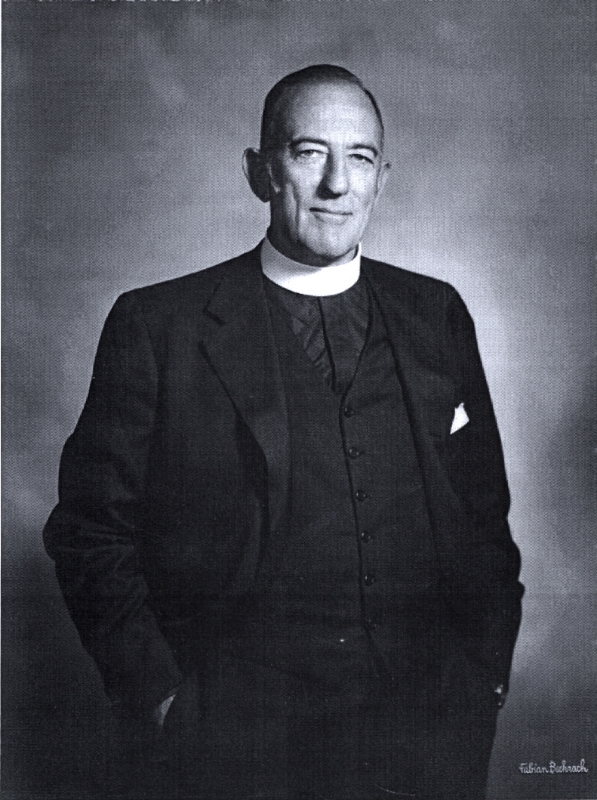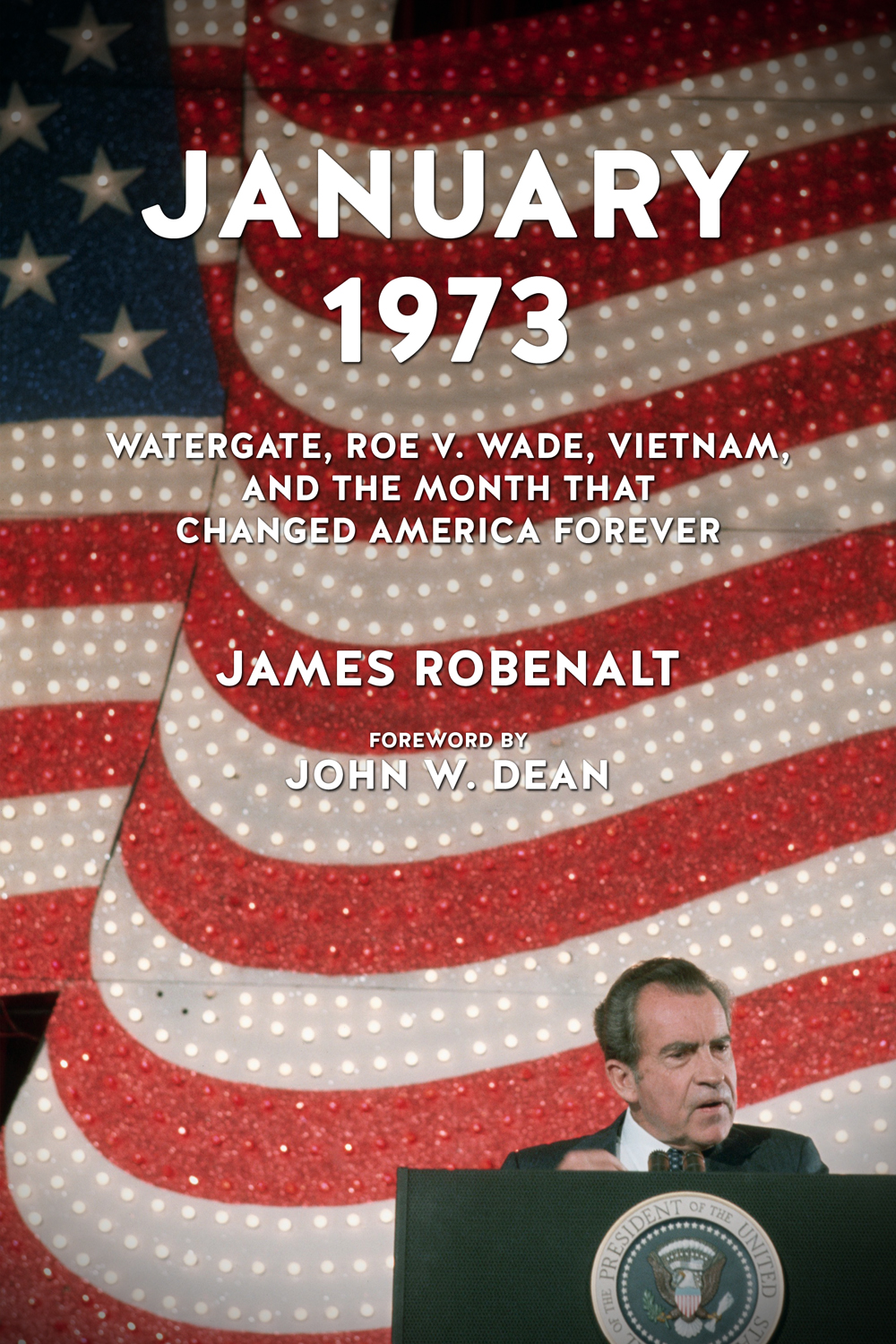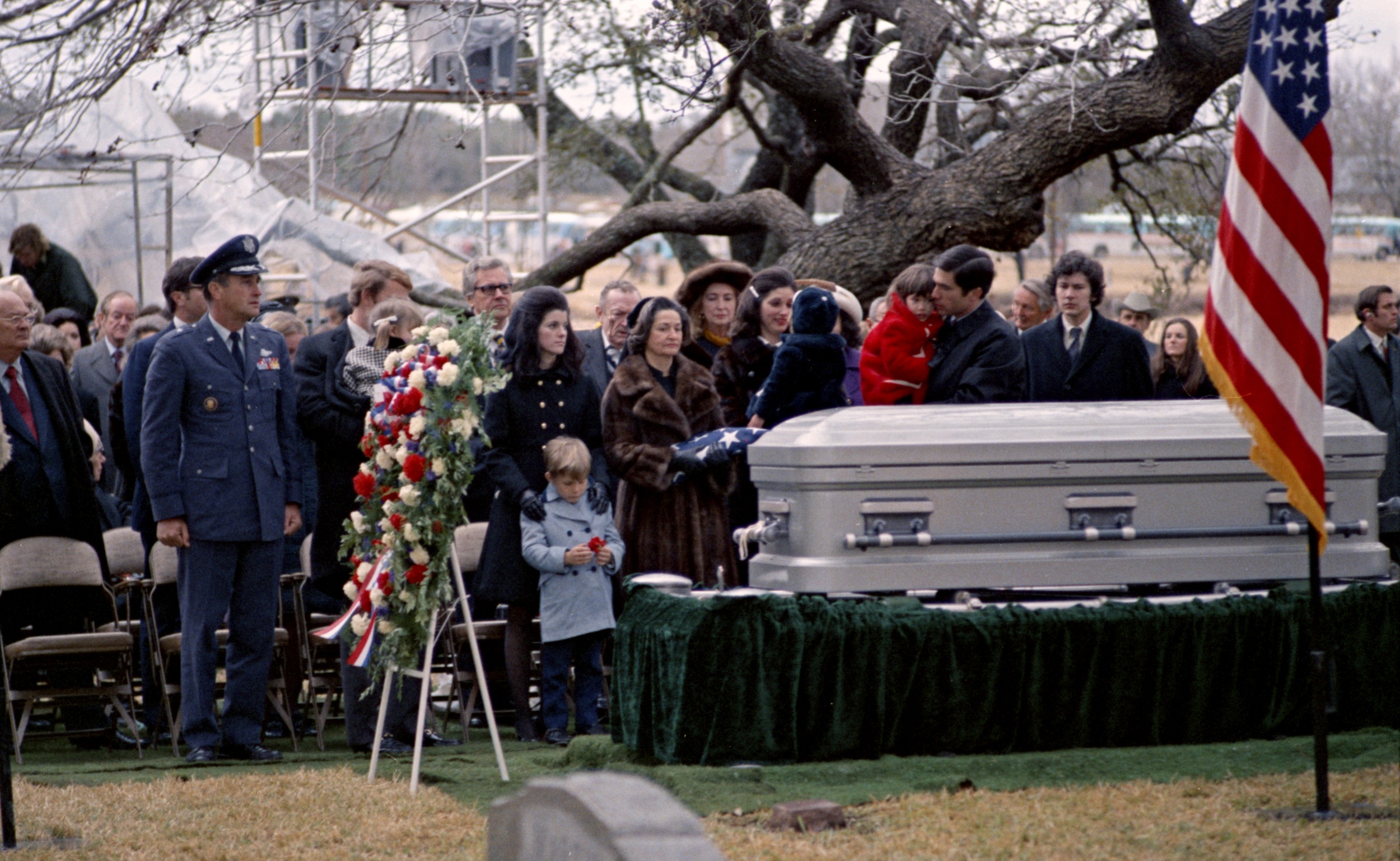







Six Events
Six Events of January 1973 That Changed the Course of American Politics
Six Events
Six Events of January 1973 That Changed the Course of American Politics
Six events in January 1973 changed American politics forever. Read about these events and their interconnections. These events marked a major turning point and explain much about the current state of deadlock in the government of the United States.
A photo from the Watergate Burglars' criminal trial in January 1973. This is where the burglars were found by police, hiding behind this secretary's desk outside chairman Larry O'Brien's office in the Democratic National Committee's headquarters in the Watergate complex.

Truman's Passing
1. Harry Truman's Passing
Truman's Passing
1. Harry Truman's Passing
Harry Truman died the day after Christmas 1972. His memorial service in Washington, D. C., would take place on January 5, 1973.
His death was a marker and had connections to the other great stories of January 1973.


Dean Francis B. Sayre of the Washington National Cathedral. Sayre was Woodrow Wilson's grandson, the last child born in the White House. Bess Truman selected Sayre to deliver Truman's eulogy. Nixon referred to Sayre as "an ass" and obsessed over how he could avoid the memorial service even though he would be in Washington on January 5. Nixon's animus for Sayre arose from two things: (1) Sayre was a vocal opponent to the Vietnam War and led protests outside the White House; and (2) Nixon and his attorney general, John Mitchell, had been called out at the memorial service for Justice Hugo Black in September 1971 (Sayre was presiding but did not deliver the eulogy). Nixon had no intention of giving Sayre a free shot at Truman's memorial.
Connections to the other great stories of January 1973:
1. Truman's actions in Korea started the policy of containment of communism in the Far East, which led eventually to America's involvement in Vietnam. With Truman's passing and the coincident end of the Vietnam War for the US in January 1973, a particular brand of American hubris--the belief that American military power could always favorably change the outcome in foreign wars--fell into disrepute. The Gulf War and the events of 9/11 resurrected the belief in American military power, but the lessons of its limitations continue to be seen in Iraq and elsewhere.
2. On the day the Korean conflict started, Truman dedicated the courthouse that would be the site of the Watergate burglars' trial. The symbolism is striking. Truman, known for his blunt honesty, stood in contrast to Nixon, who Truman considered to be a congenital lier. That Truman would dedicate the courthouse where, years later, a burglars' trial would start the chain of events that resulted in Nixon's downfall is noteworthy and ironic. That he would do so on the day the Korean conflict began--which became the activating cause for Vietnam--makes it doubly symbolic.
3. The New Deal and its extension through the programs of LBJ's Great Society (Medicare, food stamps, welfare, Head Start, Corporation for Public Broadcasting) hit the wall in January 1973 with the rise of the Nixon counterrevolution. The Nixon forces (later Reagan forces) pushed back against the idea of governmental paternalism. Nixon's second inaugural, delivered on January 20, 1973, was a call to arms. "Government must learn to take less from people so that people can do more for themselves," Nixon declared. Truman's and Johnson's passing were corporeal manifestations of the political break with the spirit of the New Deal and the Great Society. America was to be defined not by a government that would look out for the common good, but as a collection of individuals who would take responsibility for their own lives and thereby transform society. "From this day forward," Nixon said in his second inaugural, "let each of us make a solemn commitment in his own heart: to bear his responsibility, to do his part, to live his ideals--so that together, we can see the dawn of a new age of progress for America."
LBJ signing the Medicare bill as Truman looks on.
4. Justice Tom Clark. Truman appointed Tom Clark to the United States Supreme Court. LBJ would later engineer Clark's resignation by appointing his son, Ramsey Clark, as his attorney general, thereby raising the appearance of a conflict of interest in cases that would be argued by the United States. The move allowed LBJ to nominate the first African-American, Thurgood Marshall, to the Supreme Court. Clark, freed from the bonds of being a justice, authored an important law review article on abortion, which was cited by Justice Blackmun in Roe v. Wade.
Truman congratulates Tom Clark.

End of Vietnam War for the United States
2. End of the Vietnam War for the United States
End of Vietnam War for the United States
2. End of the Vietnam War for the United States
Where to begin. The Vietnam War had such a monumental impact on America and its politics it is difficult to summarize.
The Great Society foundered under the financial weight of the war; the Civil Rights movement was severely crippled; Johnson's presidency was wrecked; Nixon's political rebirth came about because of the war; America redefined its role in the world and President Nixon attempted to apply the Nixon Doctrine of "self-reliance" to the domestic sphere, starting what would become known as the "Reagan Revolution"; and Watergate would preclude Nixon from enforcing the agreement Kissinger negotiated. The impact and ramifications are almost endless.
But here is just a sampling, showing the deep interconnections with the other great events of January 1973.
Connections to the other great events of January 1973
1. Impact on Great Society and Civil Rights movement. Vietnam churned up society, activated a younger generation whose members were subject to the draft, and drove a wedge between Dr. Martin Luther King, Jr. and President Johnson at the very time LBJ was overseeing historic change in race relations. In the process, the foot soldiers of the counterrevolution--Nixon's "Silent Majority"--exercised political muscle and instituted changes that would transform the solidly Democratic South to the solidly Republican South of today. Civil Rights stalled, the war on poverty was all but abandoned.
Dr. Martin Luther King in the White House with LBJ in the background.
2. Dr. King spoke at the National Cathedral at the request of Dean Francis Sayre (see the Truman memorial) on Sunday, March 31, 1968. Here in part his comments about the war:
“I am convinced that it is one of the most unjust wars that has ever been fought in the history of the world. Our involvement in the war in Vietnam has torn up the Geneva Accord. It has strengthened the military-industrial complex; it has strengthened the forces of reaction in our nation. It has put us against the self-determination of a vast majority of the Vietnamese people, and put us in the position of protecting a corrupt regime that is stacked against the poor.
It has played havoc with our domestic destinies. This day we are spending five hundred thousand dollars to kill every Vietcong soldier. Every time we kill one we spend about five hundred thousand dollars while we spend only fifty-three dollars a year for every person characterized as poverty-stricken in the so-called poverty program, which is not even a good skirmish against poverty.
Not only that, it has put us in a position of appearing to the world as an arrogant nation. And here we are ten thousand miles away from home fighting for the so-called freedom of the Vietnamese people when we have not even put our own house in order. And we force young black men and young white men to fight and kill in brutal solidarity. Yet when they come back home that can’t hardly live on the same block together.”
Click here for the entire text of the sermon.
3. That same evening, March 31, 1968, Lyndon Johnson went on national television to say he would not run for president in 1968, as he wanted to concentrate all his energies on his peace initiative in Vietnam.
In 1966, it was hard to imagine a popular LBJ not running for and easily winning re-election in 1968. The Vietnam War reversed everything. The war's end would come the same week that LBJ died.
Four days after his sermon in the National Cathedral and LBJ's withdrawal from the race, Dr. King was assassinated in Memphis. The rights movement was severely crippled.
Memphis, Tennessee, April 4, 1968
4. Johnson's withdrawal, the chaos of the times, all contributed to Richard Nixon's ability to rehabilitate himself and run again for the presidency. His victories in 1968 and 1972 both hinged on how to end the war in Vietnam.
Nixon with Johnson after his victory in 1968
5. With the presidency comes the right to nominate Supreme Court justices. Nixon would appoint three justices who would have defining influences on the Supreme Court's decisions on abortion. Chief Justice Burger, Justice Blackmun and Justice Powell each played unique and decisive roles in the outcomes in Roe v. Wade and its companion case, Doe v. Bolton, decided in January 1973.

Watergate Trial
3. Watergate Burglars' Trial
Watergate Trial
3. Watergate Burglars' Trial
In the second week of January 1973, the trial of the seven men indicted for the Watergate break-in started in Judge John S. Sirica's courtroom. The trial will start the chain of events that will eventually bring down the president--the only resignation of a president in American history.
The trial has connections to the other great events of January 1973.
This crash of a United airliner near MIdway Airport in Chicago in December 1972 has unexpected consequences in the White House.
Howard Hunt's wife Dorothy was on this plane. Hunt who was to go on trial in January 1973 lost his will to fight. He asked the man who had brought him into the White House, Charles Colson, for help.
Hunt's wife had $10,000 in her purse. Was she the paymistress for the Watergate defendants? Nixon asked if the money was traceable when he learned of the tragedy.
Colson drew Nixon further into the conspiracy to cover-up when he spoke with Nixon on January 8, 1973 about clemency for Hunt if he pled guilty. The conversation was in Nixon's office in the Executive Office Building. The tape of this meeting is difficult to hear because of the poor placement of the microphones in that office.
John Sirica believed higher-ups were involved and that the truth was being "whitewashed." He became more prosecutor than judge.
The trial will result in guilty verdicts. One defendant, James McCord, will eventually break and start the undoing of the conspiracy. But this trial and Nixon's silence about the Christmas bombing will lead to the Senate vote in the first week of February 1973 to investigate the Watergate break-in.
The Ervin Committee. Henry Kissinger will contend that Nixon's problems with Watergate diverted his attention from enforcing the Peace Accords in Vietnam.
Nixon at Camp David at the height of the Watergate crisis.

Nixon's Second Inaugural
4. Nixon's Second Inaugural
Nixon's Second Inaugural
4. Nixon's Second Inaugural
One of the real surprises of this surprising month. Nixon in the early morning hours of January 20, 1973--the day he will be inaugurated for a second time--has a long phone call with Chuck Colson, describing his intentions for a second term.
Link to the tape here.
Nixon takes the "Nixon Doctrine" in foreign policy and applies it to domestic politics. His intent is to dismantle the excesses of the Great Society and reduce the power of the federal government. This is a game-changer. Though Nixon will lose the battle with his resignation, he will win the war, starting a conservative movement that would take hold during Reagan's presidency.
Nixon's policy in Vietnam: turn over the defense of South Vietnam to the South Vietnamese. This "Nixon Doctrine" was now to be applied to domestic politics. The common theme: self-reliance.
“We shall do our share in defending peace and freedom in the world. But we shall expect others to do their share.
The time has passed when America will make every other nation’s conflict our own, or make every other nation’s future our responsibility, or presume to tell the people of other nations how to manage their own affairs.
Just as we respect the right of each nation to determine its own future, we also recognize the responsibility of each nation to secure its own future.
Just as America’s role is indispensable in preserving the world’s peace, so is each nation’s role indispensable in preserving its own peace.”
Prayers for the nation and its president
“Just as building a structure of peace abroad has required turning away from old policies that failed, so building a new era of progress at home requires turning away from old policies that have failed.
Abroad, the shift from old policies to new has not been a retreat from our responsibilities, but a better way to peace.
And at home, the shift from old policies to new will not be a retreat from our responsibilities, but a better way to progress.
Abroad and at home, the key to those new responsibilities lies in the placing and the division of responsibility. We have lived too long with the consequences of attempting to gather all power and responsibility in Washington.
Abroad and at home, the time has come to turn away from the condescending policies of paternalism—of ‘Washington knows best.’
A person can be expected to act responsibly only if he has responsibility. This is human nature. So let us encourage individuals at home and nations abroad to do more for themselves, to decide more for themselves. Let us locate responsibility in more places. Let us measure what we will do for others by what they will do for themselves.”
Nixon will take deliberate aim at JFK's inaugural "ask not" line.
“And so, my fellow Americans: ask not what your country can do for you—ask what you can do for your country”
COMPARE TO NIXON'S VERSION BELOW
“Let us remember that America was built not by government, but by people—not by welfare, but by work—not by shirking responsibility, but by seeking responsibility.
In our own lives, let each of us ask—not just what will government do for me, but what can I do for myself?”

Roe v. Wade
5. Roe v. Wade
Roe v. Wade
5. Roe v. Wade
Roe v. Wade. Decided two days after Nixon's second inaugural. Little needs to be said of the impact of this decision on American politics. With the rise of the Religious Right, "compromise" became a thing of the past.
What is little known is how this decision was made. The idea of "viability" was not part of Justice Blackmun's first or even second drafts of the abortion cases.
January 1973 explains for the first time, based on exclusive interviews with Larry Hammond, Justice Powell's law clerk, the central role of Justice Powell and his law clerk in the fashioning of the opinion.
Justice Harry Blackmun
“The heart of the matter is that somewhere, either forthwith at conception, or at ‘quickening,’ or at birth, or at some other point in between, another being becomes involved and the privacy the woman possessed has become dual rather than sole. . . . It is not for us the judiciary, especially at this point in the development of man’s knowledge, to speculate or specify when life begins.”
Justice Lewis Powell only took part in the abortion cases after it was agreed to re-argue the cases in June 1972.
Chief Justice Burger with President Nixon in the Oval Office at approximately the same time that the Court was deciding to re-argue Roe v. Wade and Doe v. Bolton--and just days before the second, disastrous Watergate break-in. June 1972.
Powell's notes from the re-argument of Roe's companion case, Doe v. Bolton. The conference on the re-argument took place on October 11, 1972. No one argued in Doe or Roe that "viability" should be the standard.
Powell's memo to law clerk Larry Hammond asking to be reminded of the judges' decision in Abelee v Markle. This is key to understanding Roe's outcome.
AFTER THE COURT AGREED TO THE "VIABILITY" STANDARD, JUSTICE POWELL WROTE A PRIVATE NOTE TO HIS LAW CLERK ON WHO SHOULD GET CREDIT FOR THE COURT'S OPINION AS IT WAS FINALLY CONFIGURED
“It seems to me that Justice Blackmun has reached a constitutionally sound result and stated it clearly. Although he gives credit in his memo of December 1 to others, I suggest you you are entitled - particularly in view of your education of me on the viability issue - to credit that is nonetheless substantial because it will never be recognized. I think I was perhaps the first to press for [the] viability change.”

6. LBJ's Death
6. LBJ's Death
6. LBJ's Death
6. LBJ's Death
On the same day that Kissinger flew back to Paris to initial the peace agreement and that the Supreme Court issued its opinions in the abortion cases, Lyndon Johnson collapsed at his ranch in Texas and died as he was being airlifted to a nearby medical center.
The supreme irony is that his death took place just as the war that no doubt hastened his demise was ending for the United States. And as noted elsewhere in this website, the woman who swore-in Johnson on the day of the Kennedy assassination, Judge Sarah Hughes, became one of the judges who decided Roe v. Wade in the trial court.
Lyndon Johnson was just sixty-four when he died
President Nixon sent a budget to Congress within weeks of LBJ's death cutting many of the Great Society programs. The great turning point in our national politics was underway even before Johnson was buried. Nixon taped a radio address the day he returned to the White House after attending Johnson's funeral in Washington, D. C.



























